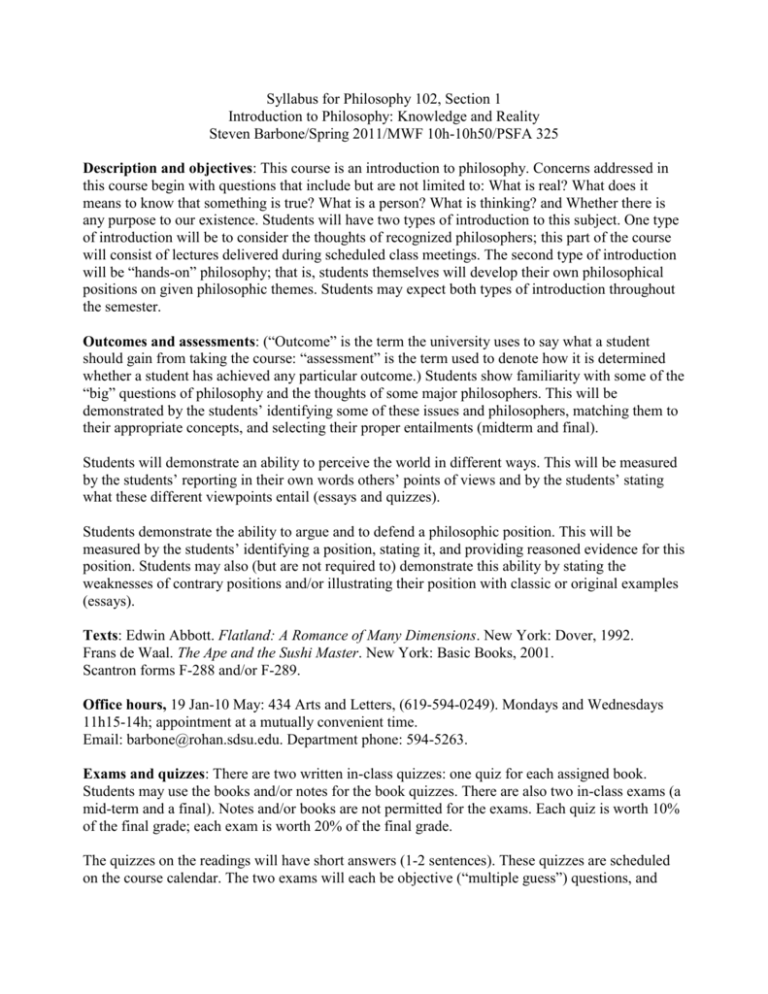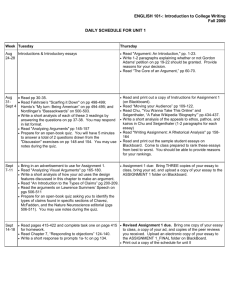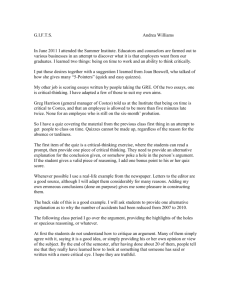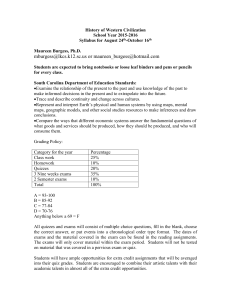1 Phil 102 Spring 2011 Syllabus for Philosophy 102, Section 1
advertisement

Syllabus for Philosophy 102, Section 1 Introduction to Philosophy: Knowledge and Reality Steven Barbone/Spring 2011/MWF 10h-10h50/PSFA 325 Description and objectives: This course is an introduction to philosophy. Concerns addressed in this course begin with questions that include but are not limited to: What is real? What does it means to know that something is true? What is a person? What is thinking? and Whether there is any purpose to our existence. Students will have two types of introduction to this subject. One type of introduction will be to consider the thoughts of recognized philosophers; this part of the course will consist of lectures delivered during scheduled class meetings. The second type of introduction will be “hands-on” philosophy; that is, students themselves will develop their own philosophical positions on given philosophic themes. Students may expect both types of introduction throughout the semester. Outcomes and assessments: (“Outcome” is the term the university uses to say what a student should gain from taking the course: “assessment” is the term used to denote how it is determined whether a student has achieved any particular outcome.) Students show familiarity with some of the “big” questions of philosophy and the thoughts of some major philosophers. This will be demonstrated by the students’ identifying some of these issues and philosophers, matching them to their appropriate concepts, and selecting their proper entailments (midterm and final). Students will demonstrate an ability to perceive the world in different ways. This will be measured by the students’ reporting in their own words others’ points of views and by the students’ stating what these different viewpoints entail (essays and quizzes). Students demonstrate the ability to argue and to defend a philosophic position. This will be measured by the students’ identifying a position, stating it, and providing reasoned evidence for this position. Students may also (but are not required to) demonstrate this ability by stating the weaknesses of contrary positions and/or illustrating their position with classic or original examples (essays). Texts: Edwin Abbott. Flatland: A Romance of Many Dimensions. New York: Dover, 1992. Frans de Waal. The Ape and the Sushi Master. New York: Basic Books, 2001. Scantron forms F-288 and/or F-289. Office hours, 19 Jan-10 May: 434 Arts and Letters, (619-594-0249). Mondays and Wednesdays 11h15-14h; appointment at a mutually convenient time. Email: barbone@rohan.sdsu.edu. Department phone: 594-5263. Exams and quizzes: There are two written in-class quizzes: one quiz for each assigned book. Students may use the books and/or notes for the book quizzes. There are also two in-class exams (a mid-term and a final). Notes and/or books are not permitted for the exams. Each quiz is worth 10% of the final grade; each exam is worth 20% of the final grade. The quizzes on the readings will have short answers (1-2 sentences). These quizzes are scheduled on the course calendar. The two exams will each be objective (“multiple guess”) questions, and Phil 102 2 Spring 2011 students will be required to provide scantron forms (F-288 and/or F-289) to take these exams. These exams will be given as scheduled on the course calendar. A description of the format will be provided in advance. Review sessions for each exam occur normally on Mondays, Wednesdays, and Fridays from 10h00-10h50, i.e., each class is a review session for the exams. The final exam is not cumulative. All assigned readings, whether covered in class or not, may be tested. Also, all material covered in class, whether assigned as a reading or not, may count as material to be tested. Under the rarest circumstances, if a student is absent the day of a quiz/exam, that student may request a make-up quiz/exam. No student should assume that the request to have a make-up will be honored. Make-ups are possible only for the most extreme reasons; the instructor reserves the right to decide whether a student merits the opportunity to take a make-up quiz/exam. Students ought to expect that any make-up quiz/exam will be more difficult than the one given in class (since the student will presumably have had more time to prepare, it would be fair that the quiz/exam be more difficult). If a student foresees having to miss a scheduled quiz or an exam, that student may request to take the quiz/exam at an earlier time without penalty. Any quiz or exam not completed within 10 days will be scored as zero. Essays: Two short writing assignments (average about 2 pages each) will be collected by the instructor for grading. Each essay is worth 20% of the final grade so that both essays together will count for 40% of the final grade. Each essay will receive a score from 0 to 4 (inclusive) and is due no later than the end of the scheduled class time on the dates listed on the calendar. A late penalty of no more than 1/2 point per class day will be subtracted from essays received later than the assigned date. Essays may be turned in via email or through the drop box option on Blackboard. Written assignments not turned in during class time may be left pinned to the instructor’s door (AL 434) if a student is otherwise unable to bring the assignment to the class meeting. A student may turn in an essay for credit or to get feedback before the due date. In assigning point values to the essays, although a student’s reasoning ability will determine the major portion of the score, other factors such as style, grammar, spelling, etc. will be considered. See information in the Course Information section on Blackboard. Essay themes: Essay 1 (due 18 February) “Mind or Body?” Essay 2 (due 29 April) “Does Everything Happen for a Reason?” Attendance: Attendance is expected, and absence does not excuse a student from taking a quiz or from learning the material covered in the missed class(es). The instructor will not do a roll call or otherwise mark attendance. It is in a student’s better interest to attend each class meeting. There are no make-up classes but for one exception. If a student foresees being absent and communicates this to the instructor, this class can be made up at a time mutually convenient to both instructor and student. A make-up class is a privilege and not a right with the exception that students who know that they will have to miss a class because of participation in an official SDSU athletic event as a member of the team, band, etc., and/or because of religious holidays are reminded that university policy requires that they notify their instructors within the first two weeks of classes in order to have their schedules accommodated. 1 February is the last day to arrange for Phil 102 3 Spring 2011 make-up sessions for such foreseeable absences. No make-up classes will be offered for 25 March or 4 April.There are no other exceptions to the attendance policy. Grades: Scores for the quizzes, essays, and exams will be made according to the guidelines in the SDSU General Catalogue. That is, 4.0 = A; 3.0 = B, and so on. A grade of 2.0 (C) signifies that the work is acceptable; 1.0 (D) signifies that the work is minimally acceptable for credit; 0 (F) signifies that the work is not acceptable for credit; 3.0 (B) signifies that the work is better than average; 4.0 (A) signifies excellence, and excellence is truly rare. Other grades may be assigned (e.g., 3.5, 2.3, etc.) Quizzes on the readings will be general in nature, and their purpose is to ensure that the material has been read by the students. Those students who demonstrate some thought and insight about the reading will earn a higher grade than those who merely show familiarity with the work. A rubric for assigning grades for these quizzes is available in the Course Information section in Blackboard. Grading for the quizzes is based on a student’s providing the following evidence: 0: little or no evidence of having read the book 1: having read some/most of the book 2: having read the book but nothing more 3: having read the book and thought about it 4: having extremely insightful thoughts about book The essays will allow students to do their own philosophy. For these essays, students will make a philosophical claim and provide evidence and reasoning why that claim is at least as acceptable as other rival claims. Students will have the opportunity to learn argumentation styles and techniques during lectures; various positions and the reasons for and against them will also be presented during the lectures. A rubric for assigning grades to these essays is available in the Course Information section under Blackboard. The exams will measure how much of the lecture material the student has remembered and is able to apply to related situations and the main issues focused on in the course. Scores for the exams will be determined a posteriori using a system of statistical analysis. These grades are based on the following provisional t-score cutoff points: A = 700; AB = 650; B = 600; BC = 550; C = 500; CD = 450; D = 400; DF = 350; F < 350. Mean of the t-distribution = 500 (by definition). Standard deviation of the t-distribution = 100 (by definition). This sample curve is provided as “insurance.” The instructor reserves the right to place the breakpoints at lower (but never higher) values depending on how the grades cluster. Any adjustment to the scoring mechanism is the right of the instructor and will be used only to enhance, never to lower, a student’s score. The grading policy will be explained in class, and information on the exam results will be distributed following the first exam. The final grade is computed by averaging the quiz, essay, and exam grades according to the percentages noted above. The average final grade for this class historically has been close to C+. Phil 102 4 Spring 2011 Grades for individual quizzes, essays, and exams will be posted on Blackboard. It is the student’s responsibility to see that a grade is assigned for each assignment. Other: Some course material (some notes, extra readings, etc.) will be made available to students on Blackboard. Such material is optional reading for students, and students will be informed about when these optional readings are posted. Students are not required to use Blackboard or email, but they are encouraged to make use of these resources for study materials, questions, email communications, and keeping track of their grades. In many cases, Blackboard will be the sole source of this type of information. All students with special needs due to a documented medical condition should avail themselves of the resources of the Student Disability Services, Suite 3101, Calpulli Center (across the street from the Gateway Center), 594-6243. Students who have such concerns that might prevent them from otherwise doing well in this course should discuss this with the instructor so that proper arrangements may be made to accommodate their conditions. The use of laptop computers is allowed, but students should be mindful that flickering screens are generally very distracting to those around them; please refrain from using a computer for activities other than note taking. No one is required to be attentive or interested in classroom activities, but all students are expected to behave as if they were interested in order not to disturb or to distract students who are making the effort to be attentive. Essay information: Essays are expected to be well written, and both machine-written and handwritten papers are acceptable. You should put some form of identification on each page (name and/or red-id number), and the pages should be numbered sequentially beginning with “1”; this rules applies even to papers turned in electronically. Pages should be mechanically attached with a staple or paper clip. These are standard practices that you should follow for every class, and they are required for this class. In fact, the instructor will not read any page that is not mechanically attached to the first page nor will he read any page that doesn’t have some form of identification (name or red-id) on it. (If it’s not good enough to have your name on it, it’s not good enough for me to read.) See the Course Information section on Blackboard for some further information about your essays. End of syllabus Phil 102 5 Spring 2011 Course Calendar Philosophy 102, section 1 Spring 2011 Though dates for lecture topics are tentative, dates for quizzes on readings and exams are firm! Week 1: 19 Jan-21 Jan Introduction; systems. Week 2: 24 Jan-28 Jan Reality or appearance? Illusion Week 3: 31 Jan-04 Feb Flatland. What’s real? !!! Reading quiz #1 – Flatland – 31 Jan !!! *** Last day to drop classes – 01 Feb *** Week 4: 07 Feb-11 Feb All illusion; no body, just soul. *** Last day to apply to graduate in May – 08 Feb *** Week 5: 14 Feb-18 Feb How can we be certain about anything? !!! Essay #1 – “Mind or Body?” – 18 Feb !!! Week 6: 21 Feb-25 Feb Does God exist? Week 7: 28 Feb-04 Mar If God is perfect, how come I’m not? Week 8: 07 Mar-11 Mar Mind over matter? Week 9: 14 Mar-18 Mar Bodies and minds. !!! Mid-term exam 18 March. Bring scantron !!! Week 10: 21 Mar-25 Mar Your body = your mind *** Spring Break! 28 March-01 April *** . Week 11: 04 Apr-08 Apr Matter over mind. Problem of evil. Week 12: 11 Apr-15 Apr Ape and Sushi Master. !!! Reading quiz #2 — Ape and the Sushi Master — 11 April !!! Week 13: 18 Apr-22 Apr What makes that happen? Week 14: 25 Apr-29 Apr You have no choice, or do you? !!! Essay #2 — “Does Everything Happen for a Reason?” — 29 April !!! Week 15: 02-May-06 May Week 16: 09 May Is your girl/boyfriend a zombie? The meaning of everything. Weeks 16-17: 12 May-19 May Finals !!! Final exam Wednesday, 11 May, 8:00am-10:00am. Bring scantron !!! End of calendar Phil 102 6 Spring 2011 Philosophy 102 – spring 2011 Grading criteria for written assignments Your goal is to address the prompt by taking a position for or against some claim. You want to identify your position and to explain why your position makes sense. To earn an F, you do nothing or your paper does not fulfill any of the conditions listed below. To earn a D or higher, your paper meets any of these conditions: Your name or other form of identification is not on each page. You do not identify your main point (thesis statement). You do not offer any reasoning to support this thesis whether it’s stated or not. To earn a C or higher, your paper must meet these conditions: Special and/or new terms are clearly defined. You use appropriate terms to identify concepts and ideas in context. A thesis statement is somehow expressed. You offer evidence or reasons to support your thesis (though not necessarily convincing ones). Your writing is relatively free from spelling and grammatical errors. You use an example from class to illustrate your point. To earn a B or higher, your paper must fulfill all these conditions: A thesis statement is clearly expressed. The thesis is well supported by argumentation, especially by a type reviewed in class. You use an original example to illustrate points, either your own or someone else’s. You acknowledge some alternative position to your own. To earn an A, your paper meets at least one of these conditions: Your work is interesting to read (e.g., your style is easy to follow or humorous or you use very original or new examples to support your point). You correctly identify the type of argumentation that you use. Your work either suggests a new idea and/or it applies the concepts in a novel way. You support your thesis with solid argumentation. You state an alternative position and explain why your position is stronger. Phil 102 7 Spring 2011 Philosophy 102 – spring 2011 Grading criteria for quizzes The goal for the student is to provide evidence that s/he has read the assigned reading and thought about it. To earn an F, you provide hardly any or no evidence of having read the assignment. To earn a D or higher, you provide some evidence of having looked at the assignment: You answer correctly some basic questions about the main ideas or characters. You show some recognition of main ideas or characters’ names. You correctly identify some concepts introduced or reviewed in the reading. You correctly identify and apply some terms introduced or reviewed in the assignment. To earn a C or higher, you provide evidence of having read the assignment: You answer correctly all basic questions about the main ideas and characters. You show recognition of all main ideas or characters’ names and their respective associations. You correctly identify concepts introduced or reviewed in the reading. You correctly identify and apply all terms from the assignment. Your writing is relatively free from spelling and grammatical errors (dictionaries are allowed). To earn a B or higher, you provide evidence of having read the assignment and understanding how it relates to discussions in the classroom: You apply ideas from the reading to correspondent ideas presented in the classroom. You use specific examples from the reading to illustrate your answers. You use examples not from the reading to illustrate the concepts in the reading. To earn an A, you provide evidence of the above plus that you have really thought about the assigned reading: You use very original examples to illustrate the concepts of the reading. You apply very specific events or discussions from the reading to some new situation. Your writing is excellent and/or your style is very interesting.







